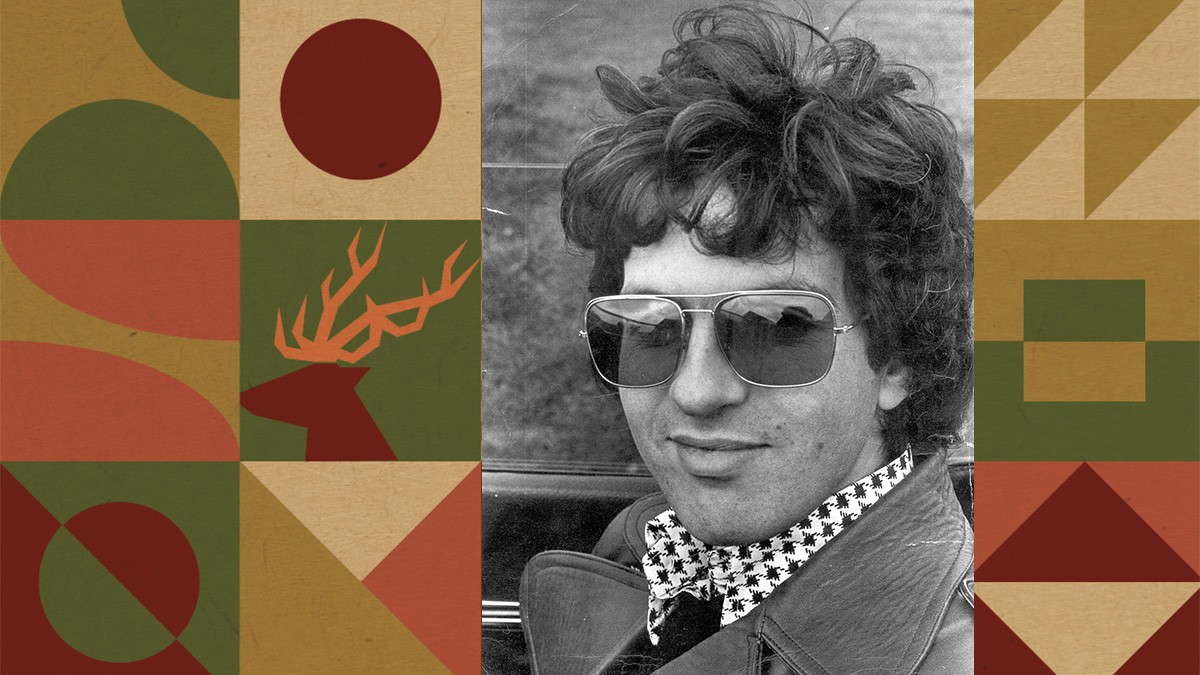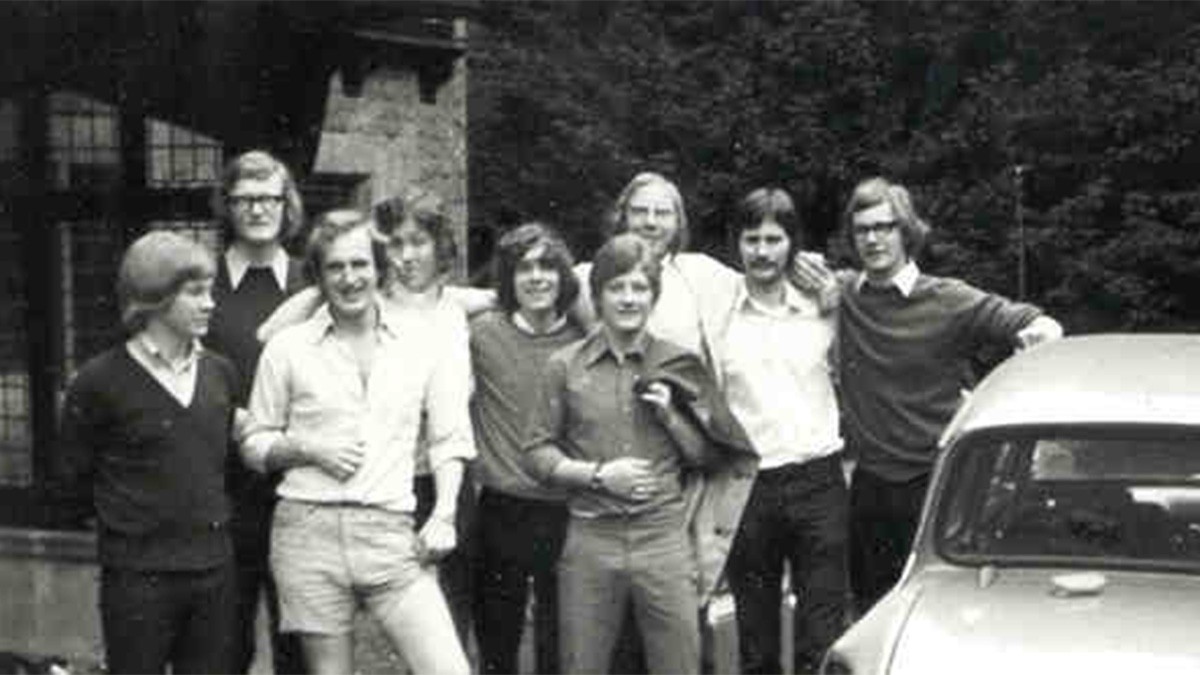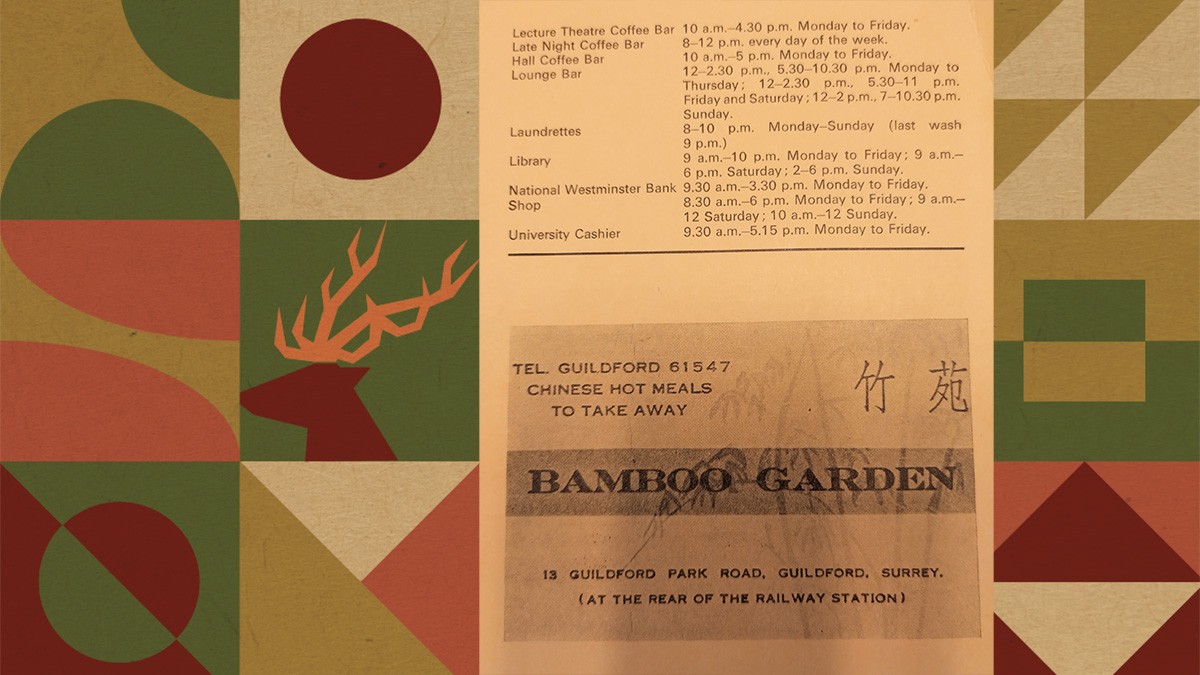“Manor House was absolutely fabulous. It was luxurious compared to other student accommodation…”
Londoner Martyn Cooper came to Surrey to study a BSc in Technological Mathematics from 1969-1973. Now living in the USA, he’s taken key roles at Apple and Data General Corporation, and launched a business on the Stock Exchange!

Martyn looking every inch like a cool dude from the 1970s
Why did you come to Surrey?
I had an interrupted high school education and I studied at a sixth form technical college in Brighton. When it was time to apply for a degree course, I knew maths was my strongest subject. I filled in my UCCA (University Central Control for Admissions) form, and I was accepted at Brunel in London and the University of Surrey.
I drove up to Guildford from Brighton to scope the place out. It was a new campus and it was quite beautiful. A few students from my college had gone to Surrey, so I had people I sort of knew there. I had no idea where it would take me vocationally, but I thought, “Why not? Let’s give it a go.”
What was it like to study at a new university?
When I arrived in 1969, I don’t remember it being that much of a muddy quagmire. I certainly didn’t need to own any wellies or anything like that. The “Diddy Houses” were being constructed when I arrived, though.
Tell us about Technological Mathematics…
This examined control theory, applied mathematics, fluid theory, multi-variant statistics and real analysis. To be honest, I’m not 100 per cent sure what the key differences between Mathematics and Technological Mathematics were.
I found the course work very hard. Fortunately, I was friends with a guy called Dave Rogers who was in the same year and he was very smart. He took me under his wing and he mentored me through it because I was way behind when I started. He finished top of the class and he won an IBM Scholarship.
What were the best bits of the course?
I enjoyed multi-variant statistics. I liked the module on differential equations, too. My main memory of the course is that I had to work hard to graduate.
Did you enjoy your time at Surrey?
Yes. I played football for the University in the second and third teams. In the first squad, we had a student named Roy Collins, who was an English schoolboys national player.
There was a lot of camaraderie, particularly when we travelled away to face universities in the surrounding area. There was a lot of rivalry when we played the University of Sussex.
I liked attending gigs, too. The Folk Club had wonderful concerts. I saw Ralph McTell and I think I saw Sandy Denny. I also made a lot of good friends. I’m still in touch with a few people from that period. We had a reunion in Guildford a few years ago.
Did you live in student accommodation?

Some of Martyn's house mates on their last day at Manor House in 1973
I was lucky enough to be offered first-year accommodation on campus in Pickard House, which was opposite the cafeteria. I lived off-site in digs in Aldershot in year two.
In my final year, I secured a place at Manor House in Godalming, which was absolutely fabulous. It was quite luxurious compared to other student accommodation. We had a communal breakfast every morning, plus amazing parties.
You were nearly knocked out at one party…
I was 20 when I arrived at Surrey and the people I lived with held a huge party for my 21st. A lot of my friends from London came down for it. Late into the party, a crowd of the guests decided to bounce me up and down. It was similar to the way people give you “bumps” in the UK. So they started throwing me up and down. I went so high in the air that my head hit the celling and it almost knocked me out!
What was Guildford like?

An advert for The Bamboo Garden from a student handbook in 1971. And the takeaway is still going strong today!
I ventured into town a bit. As a special treat, I’d sometimes have dinner at a steak house at the top of Guildford High Street. I also remember a Chinese takeaway called the Bamboo Garden, which was near the train station. That was a regular haunt if I ever fancied noodles and rice dishes.
My father, who was based in London, was quite ill while I was at Surrey. I vividly recall the walk from campus to the train station during cold and windy weather. I often questioned if I could stick it out and complete the course because I found it such hard going. But I’d conclude that I had one year under my belt, so I may as well stick it out and see if I can finish another. Then I had two years under my belt, so I decided to try and complete a third. That pragmatic attitude kept me going. I also knew the degree would open doors for me.
Did you take a year in industry?
I spent my year in industry at the Ministry of Defence in Whitehall. I had a wonderful boss. He was a brilliant man who introduced me to the world of factor and cluster analysis. He was one of the leading experts in that field. He also taught me Fortran programming, which was the first time I’d interacted with computers.
It was a great year and I learnt a lot. I also discovered civil servants didn’t work particularly hard. It was easy to get in late, break for tea, go to the pub and leave early. It encouraged a bit of indiscipline in me, which didn't serve me well when I moved to the United States.
What are your highlights from Surrey?
I have very fond memories of my girlfriend. She was from Scarborough and her dad was a vicar. There was my friendship with Dave, who helped me for the four years of the course. There were the concerts, the Students’ Union House, the football team… There are so many highlights.
What did you do once you graduated?
I got a fellowship at the Tavistock Institute in London, which is a renowned hub of research into psychology and behavioural science. I also worked on a book with Dr Frank Heller about cultural differences in decision-making. When that project ended, I got a job at Audits of Great Britain who were doing research into television audience behaviours.
In 1975, I emigrated the USA and I got a job conducting market research with a company called Centronics, who invented the dot matrix printer. That’s where I learned about the American work ethic. An 80-hour week was not abnormal.
About that time, the first mini computers were being developed and a lot of the companies doing that were based in New England where I was. I was recruited by one such business, Data General Corporation, to head up their peripherals marketing division.
That sounds like a big job!
It was. I was 26 years old and I had this huge job. They maybe thought I was smarter than I was because of my English accent! I worked with MIT graduates and people who had Harvard MBAs. I was swimming in a tank with some of the smartest people I’d ever met. But, just I had done at Surrey with Dave Rogers, I learnt from them.
After three years, they transferred me to Texas to work in sales and meet the customers. I struggled at first, but I had some success and learned about sales, then I was head-hunted.
And that was by Apple?
Yes. In 1984, Apple Computers recruited me as sales manager for the value-added sales division. I learned about channel marketing, which is where you take a computer, add software and peripherals, and turn it into a solution for a business problem. I then started up my own business because I saw a niche in the market. I met a financial backer and we created a successful company in Houston distributing components for Computer Aided Design systems. In 1997, we joined forces with a couple of similar businesses and we launched on the Stock Exchange. It was successful, but it hit problems later on.
I quit in 2000. For the last 20-plus years, I’ve managed some commercial properties and bought a second home in Crested Butte in Colorado. I’m also the owner and manager of a gym I bought, and I’m a competitive bridge player who travels around the USA playing in tournaments. It’s a nice life.
What advice would you give the undergraduate version of yourself?
Be present in your life every day and enjoy the journey. Learn to always say “Yes”, too. You never know what opportunities may come out of it.
Former coursemates can contact Martyn at martyn@equirent.com